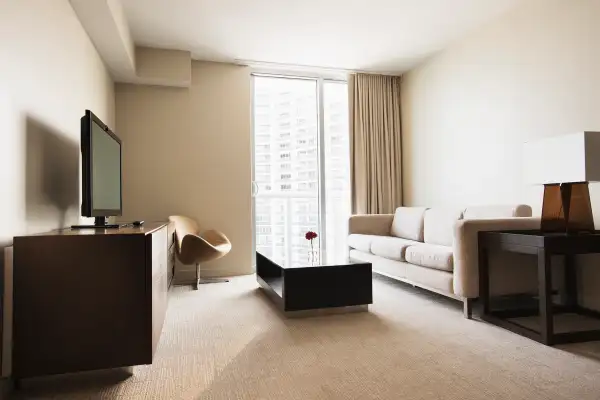12 Once-Standard Things at Hotels That Are Rapidly Disappearing

A business traveler of a generation ago suddenly dropped into a typical hotel today might barely recognize the place. Between turning their lobbies into lounges and scrapping every stick of furniture they can, today’s hotels are reinventing themselves by dropping accessories or amenities that were once standard-issue. Here’s what’s going, going, gone.
Wi-Fi Charges
With Wi-Fi becoming so ubiquitous that you can find it everywhere from McDonald’s to Target, getting hotel guests — many of whom already are paying a couple hundred bucks a night — to pay to log on was becoming a losing battle for hotels. More are throwing in the towel and making in-room Wi-Fi free for all guests, or at least those who sign up for the hotels' free loyalty programs.
Bed Scarves and Throw Pillows
Younger travelers might not even know what a "bed scarf" is. (It's that weird strip of fabric placed lengthwise along the foot of the bed.) They might have never had to chuck a bunch of throw pillows off the bed before they could actually get under the covers either. These fussy accoutrements are being removed because they are a hassle for housekeeping and run counter to the sleeker, modern look hotel decorators are after today.
Room Service
Given the high markup on food orders delivered to hotel rooms ($18 for morning coffee!?!), it may come as a surprise to learn that room service is a money pit for most hotels. A smattering of requests during offbeat hours make for a food-ordering and employee-scheduling nightmare, and room service ends up in the red as a result. The New York Hilton was the most prominent hotel to axe its room service three years ago, but many other places have been dropping it with less fanfare, as well.
Room Keys (and Room Cards)
At some hotels, those ubiquitous mag-stripe key cards are going the way of the old metal key: Starwood, the parent company for hotel brands like Sheraton, Westin, and W, pioneered a keyless entry system where guests who are members of the SPG loyalty program and download an app can get into their rooms just by waving or tapping their phone to a panel on the door. Other hotel brands are also said to be exploring the technology, so stay tuned: Your phone is likely to do more unlocking in the future.
Front Desks
Hotels have been going all Extreme Makeover on their lobbies for a while now, adding bars, comfy couches, lounge seating, and lots of free Wi-Fi. One element that's gone missing at many hotels, though, is the traditional front desk. It's being replaced by smaller workstations and tablets so the barrier between guests and staffers is eliminated at check-in.
Room Desks
Oh, those millennials: Because they spend all of their time slouching on beds or couches with their laptops open, some hotel brands started swapping out traditional desks for tables or adjustable and “multifunctional” work spaces that could also be used as dining or end tables. The results have been mixed. Some travelers say “good riddance” to heavy wooden desks and outdated accessories (seriously, who uses a blotter anymore?), but others say the new alterna-desks aren’t big enough for spreading out big binders of material, blueprints, and the like.
Carpets
Seems like hotels finally got the memo that guests were really squicked out by those carpets. Some are tearing up rugs in guest rooms and laying down vinyl tiles or similar flooring materials that are easy to install, clean, and (when they get dinged up) replace. The wrinkle is that they also have to add soundproofing underneath all those shiny new floors, since those old carpets did at least muffle footsteps in other rooms.
Bibles
Those Gideon Bibles that had been a staple in hotel nightstand drawers in the past have been quietly disappearing for years. Their demise was hastened last year by the atheist group Freedom From Religion Foundation’s lobbying for “Bible-free” rooms.
Bathtubs
Hotels are getting rid of tubs because today’s travelers don’t see much use to lounging in a tub (if they ever did, that is). Vacationers want to get out and see the destination, and business travelers are too busy for a leisurely soak. Plus, showers are easier to clean and less of a safety risk: A grayer and less-flexible traveling public can get into a shower much more easily without the risk of falling that a bathtub presents.
Closets
In trying to squeeze more square footage out of their buildings, hotels are making their guest rooms smaller, which means closets that take up valuable square footage and being shown the door. Hotels are instead swapping in open clothing racks with hangers, alcoves that can be curtained off or left open, or even hooks on the wall that do the job without eating up a chunk of floor space. (Building rooms without closets is also a lot cheaper.)
Daily Sheet and Towel Changes
Reusing towels and sheets for more than a day (which literally everyone not staying at a hotel does every day) saves water and saves the hotel on housekeeping costs. That’s why more are making it optional, with more than 75% of hotels implementing a sheet and towel-reuse program, and some offering small incentives like a free drink for guests who reuse linens.
Business Centers
Now that everyone’s carrying a plethora of wi-fi enabled and cellular-connected digital devices, there’s far less need for access to a desktop computer. Mobile apps and QR codes make physically printing documents nearly obsolete too. As a result, hotels are realizing they can make more money off their business centers by turning them into something else. And, as some security experts have pointed out, in this age of increasingly sophisticated hacking, those common computers were a security hole big enough to drive a truck through.
